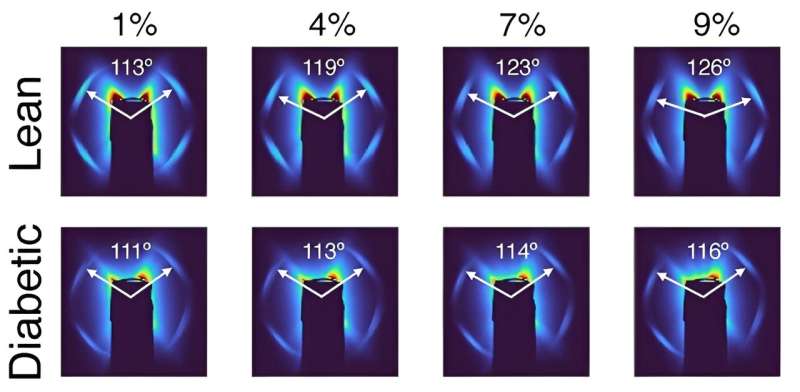This article has been reviewed according to Science X's editorial process and policies. Editors have highlighted the following attributes while ensuring the content's credibility:
fact-checked
trusted source
proofread
Type 2 diabetes alters the behavior of disks in the vertebral column, study shows

Type 2 diabetes alters the behavior of disks in the vertebral column, making them stiffer, and also causes the disks to change shape earlier than normal. As a result, the disk's ability to withstand pressure is compromised. This is one of the findings of a new study in rodents from a team of engineers and physicians from the University of California San Diego, UC Davis, UCSF and the University of Utah.
Low back pain is a major cause of disability, often associated with intervertebral disk degeneration. People with type 2 diabetes face a higher risk of low back pain and disk-related issues. Yet the precise mechanisms of disk degeneration remain unclear.
Investigating the biomechanical properties of the intervertebral disk is crucial for understanding the disease and developing effective strategies for managing low back pain. The research team was co-led by Claire Acevedo, a faculty member in the Department of Mechanical and Aerospace Engineering at the University of California San Diego, and Aaron Fields, faculty in the Department of Orthopaedic Surgery at UC San Francisco.
The study is published in the journal PNAS Nexus.
"These findings provide novel insight into the potential mechanisms underlying diabetes-related disk tissue damage and may inform the development of preventative and therapeutic strategies for this debilitating condition," the researchers write.
The study emphasizes that nanoscale deformation mechanisms of collagen fibrils accommodate compressive loading of the intervertebral disk. In the context of type 2 diabetes, these mechanisms are compromised, resulting in collagen embrittlement. These findings provide novel insight into the potential mechanisms underlying diabetes-related disk tissue damage and may inform the development of preventative and therapeutic strategies for this debilitating condition.
Researchers employed synchrotron small-angle X-ray scattering (SAXS), an experimental technique that looks at collagen fibril deformation and orientation at the nanoscale. They wanted to explore how alterations in collagen behavior contribute to changes in the disk's ability to withstand compression.
They compared disks from healthy rats to those from rats with type 2 diabetes (UC Davis rat model). The healthy rats showed that collagen fibrils rotate and stretch when disks are compressed, allowing the disk to dissipate energy effectively.
"In diabetic rats, the way vertebral disks dissipate energy under compression is significantly impaired: diabetes reduces the rotation and stretching of collagen fibrils, indicating a compromised ability to handle pressure," the researchers write.
Further analysis showed that the disks from diabetic rats exhibited a stiffening of collagen fibrils, with a higher concentration of non-enzymatic cross-links. This increase in collagen cross-linking, induced by hyperglycemia, limited plastic deformations via fibrillar sliding.
These findings highlight that fibril reorientation, straightening, stretching, and sliding are crucial mechanisms facilitating whole-disk compression. Type 2 diabetes disrupts these efficient deformation mechanisms, leading to altered whole-disk biomechanics and a more brittle (low-energy) behavior.
More information: James L Rosenberg et al, Type 2 diabetes impairs annulus fibrosus fiber deformation and rotation under disc compression in the University of California Davis type 2 diabetes mellitus (UCD-T2DM) rat model, PNAS Nexus (2023). DOI: 10.1093/pnasnexus/pgad363





















